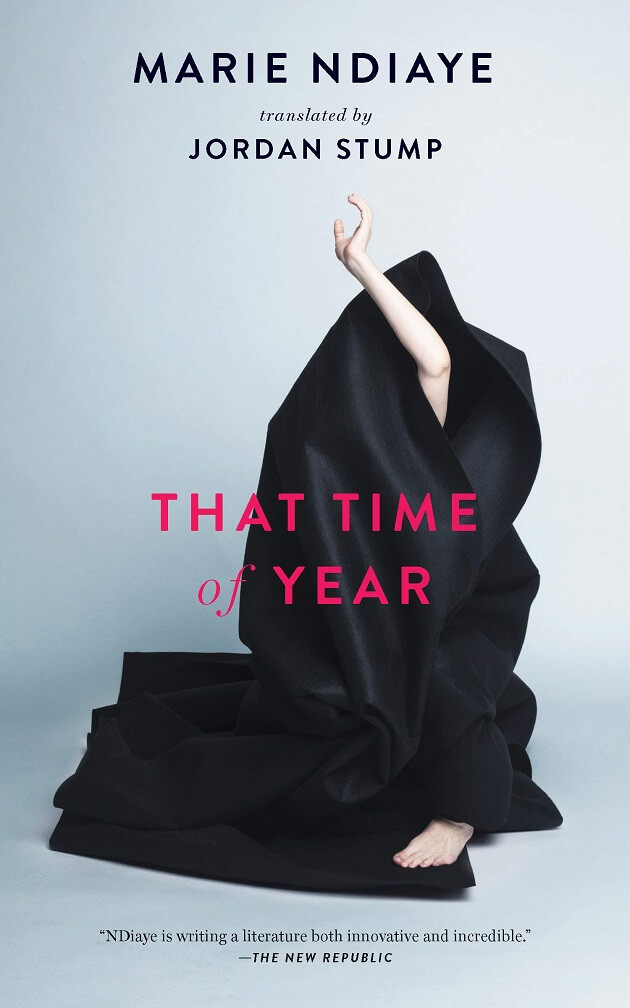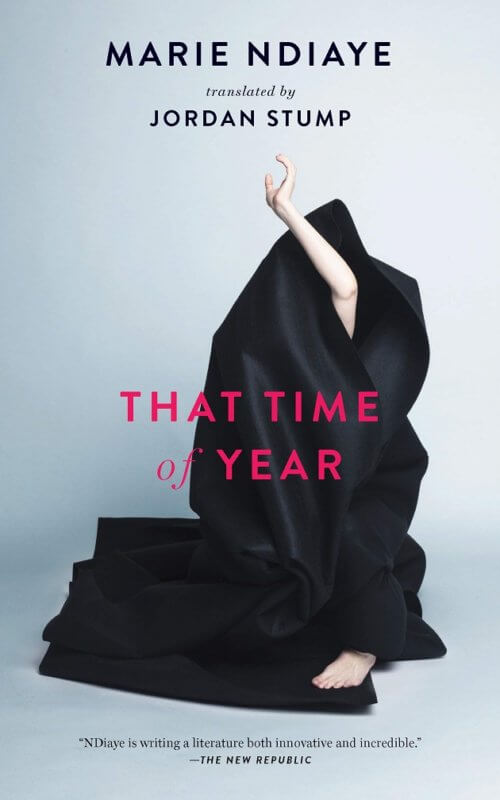18 Aug / That Time of Year by Marie NDiaye, translated by Jordan Stump [in Shelf Awareness]

 At a little more than 100 pages, That Time of Year by Marie NDiaye (Ladivine) might initially seem spare. The intriguing complexity, however, contained in her superb novel underscores again why she is one of France’s most lauded contemporary writers, having received her country’s highest literary honors, including the Prix Femina and the Prix Goncourt. NDiaye’s taut, noirish horror, complicated by Kafka-esque obstacles, is seamlessly translated into English by professor Jordan Stump.
At a little more than 100 pages, That Time of Year by Marie NDiaye (Ladivine) might initially seem spare. The intriguing complexity, however, contained in her superb novel underscores again why she is one of France’s most lauded contemporary writers, having received her country’s highest literary honors, including the Prix Femina and the Prix Goncourt. NDiaye’s taut, noirish horror, complicated by Kafka-esque obstacles, is seamlessly translated into English by professor Jordan Stump.
Each June, Herman travels with his wife, Rose, and their son to a remote village where the family has a summer home. As a Parisian, “he’d made it a point of pride to behave with the slightly superior civility he thought the only suitable stance for citizens of the capital, always intent on revealing their sophistication but too fine to make a show of it.” Even after 10 summers, Herman and his family are still considered tourists by the locals and, as such, are expected to leave by August 31. This year, however, they’ve veered from predictable habits and stayed an extra couple of days. Consequences loom: “by letting September come to them here when September was a month they knew only in Paris, he and Rose had laid themselves open to unknown tribulations they might not be strong enough to withstand.”
That September 1 afternoon, mother and son venture out to buy eggs. Hours later, they have not returned. The sunny warmth that’s always lasted, as least through August 31, has suddenly turned to cold rain. Worried, Herman visits the neighboring farm, but the surprisingly inhospitable woman there insists she hasn’t seen his family, nor does she even offer him dry shelter. He next searches the village shops, and eventually arrives at the gendarme’s office in heightened concern. The lone officer is of no help, insisting Herman must return the next morning during official hours. He survives a remorseful night. Bypassing the unhelpful gendarmerie, he seeks the mayor instead, and is met with labyrinthine, impenetrable bureaucracy. Only the Chamber of Commerce president seems to be willing to help. His bizarre edict that Herman must “become a villager [him]self – invisible, insignificant,” is Herman’s only hope of family reunion. And so, he stays.
Reminiscent of a Beckett play – NDiaye is also a notable playwright – this surreal narrative quickly devolves into a nightmarish fever dream. With adroit precision, NDiaye transforms Herman’s situation, his choices (or lack thereof), his complicity, his feeble attempts at rebellion, into a biting, brilliant exposé on class and privilege, entitlement and hypocrisy, power and control.
Shelf Talker: At the end of their summer holiday, a Parisian schoolteacher’s wife and son never return from a simple errand, setting off a surreal search in a remote French village.
Review: Shelf Awareness Pro, August 17, 2020
Readers: Adult
Published: 2012 (France), 2020 (United States)
